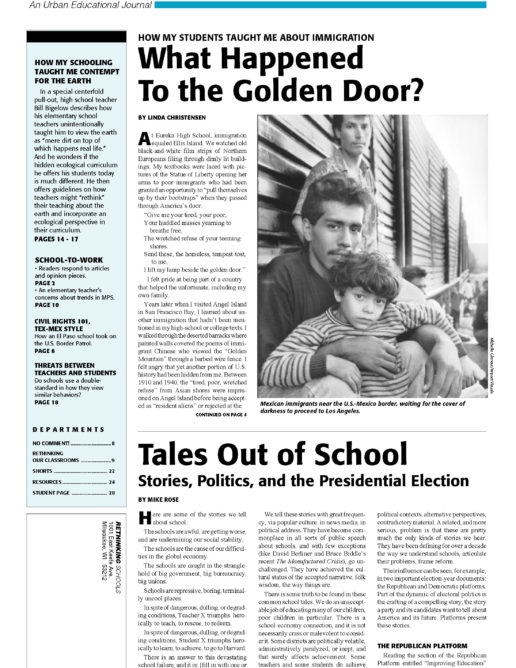Preview of Article:
Tales Out of School
Stories, Politics, and the Presidential Election
Reading the section of the Republican Platform entitled”Improving Education” (or the Republican National Committee’s news release on education issued one month earlier), one is struck by the dire state of things:”The American people know that something is terribly wrong with our education system.” One would expect a presidential challenger to depict the status quo as being in need of change, but even so the language is severe the National Committee document uses the word “dilapidation” to describe the public school system. The solution? Choice. Which will bring “nothing less than a renaissance in American education.” There is another reason for the awful shape we’re in: “liberal fads of the last 30 years.” These will be remedied through “discipline,parental involvement, emphasis on basics including computer technology, phonics instead of look-say reading, and dedicated teaching” though no mechanism is mentioned to facilitate these remedies.
In addition to choice, there are two other proactive proposals:a pledge to work for the return of voluntary prayer, and a call “to dedicate one full day each year solely to studying the Declaration of Independence and the Constitution.”
The rest of the recommendations call for the dismantling of the status quo: abolish the Department of Education (to “end federal meddling in our schools”), repeal Goals 2000 and the School-to-Work Act of 1994, end federal attempts to impose outcome- or performance-based education on local schools,and oppose school-based health clinics in favor of “abstinence education”in the home.
We see in this platform many of the tales we have come to tell about school. And these are woven into a broader narrative of academic and moral degradation, wrought by evil forces within the schools and government, and a narrative of redemption, a story of rebirth through choice and a return to basics.
The Democratic Platform
The Education Platform of the Democratic Party, as one might expect from the party of the incumbent, is more upbeat, championing the Clinton administration’s priorities (e.g., Goals 2000, School-to-Work) and recounting its efforts to forestall Republican cuts in education funding e.g., the school lunch programs. “Today’s Democratic Party will stand firmly against the Republican assault on education.”

